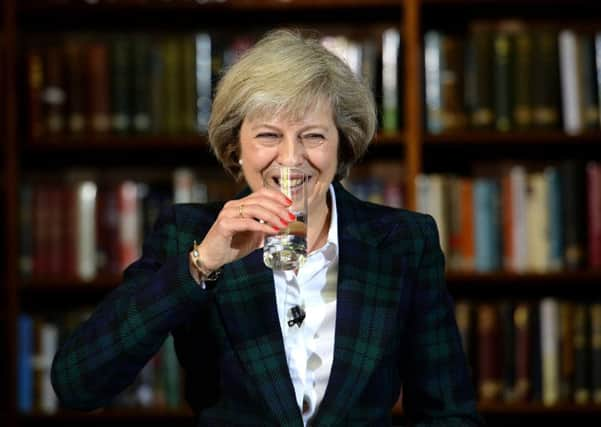Tom Richmond: Theresa May and Andrea Leadsom to take helm to weather Brexit storm


Harold Wilson was succeeded in 1976 by James Callaghan who regretted, to his dying day, not imposing a state of emergency during the catastrophic ‘winter of discontent’ which ended with Margaret Thatcher coming to power.
Mrs Thatcher was – in turn – followed in 1990 by John Major who did, to his credit, win a subsequent election before the economy went haywire as the Tories tore themselves apart over European integration, a battle which culminated with Britain voting to leave the EU in last month’s historic referendum.
Advertisement
Hide AdAdvertisement
Hide AdAnd Sir John’s successor Tony Blair was then replaced in 2007 by Gordon Brown just before the global economy and banking system hit rock bottom.
Yet there is a difference between these events and the current contest to determine David Cameron’s successor, as Tory MPs undertake the first of a series of votes that will whittle down the number of candidates to a final shortlist of two.
The very beginning of the Callaghan, Major and Brown premierships can all be characterised as the proverbial calm before the storm. This time the storm was, in fact, the country’s momentous decision on June 23 to defy Mr Cameron’s recommendation and vote to leave the European Union and what is required is a period of calm so the next PM can formulate a Brexit plan which secures trading alliances on the most advantageous terms possible.
And, given the need for an unifying leader unsullied by factional feuding, the only person remotely capable of forming a new unity government is Theresa May.
Advertisement
Hide AdAdvertisement
Hide AdHer record speaks for itself. When she became the Tory prospective candidate for Maidenhead, her constituent Bernard Donoughue – policy advisor to both Wilson and Callaghan – noted her presence at a Christmas drinks party in his diary for December 22, 1996.
“Seemed bright, straight and strong though very unforthcoming and perhaps not very good on humour,” wrote Lord Donoughue in a candid observation in his addictive new memoir, Westminster Diary, which chronicles his travails as a junior minister in the Blair government. “Cautiously, though understandably in the presence of a Labour man, declined to give any views on their next leader after Major’s inevitable defeat.”
Such discretion helps to explains why the vicar’s daughter has been the longest serving Home Secretary since the late 1800s. She found a way to stay above the daily political squabbles because of her unflappable manner – Douglas Hurd, one of her predecessors, told Lord Donoughue that Mrs Thatcher gave the Home Office a wide berth because the law and order brief was a minefield.
This was borne out when Nick Clegg complained to Mr Cameron about Mrs May’s modus operandi. “She has no small talk, literally none,” said the Deputy Prime Minister. The PM’s reported reply? “Nick, it’s nothing personal. She’s exactly the same with me!” And Mrs May warmed to the theme when she made her own pitch for the leadership: “I know I’m not a showy politician... I just get on with the job in front of me.” I think we’ve all had enough of political spin.
Advertisement
Hide AdAdvertisement
Hide AdShe is also not a shrinking violet – despite her promotion to the Home Office in 2010 surprising many. She’s taken on the Police Federation and won; she secured the deportation of hate preacher Abu Qatada when told it was impossible; she sought to right the Hillsborough miscarriage of justice and stood up to George Osborne on police cuts.
Yes, Mrs May’s candidacy does have its drawbacks. She’s been in charge of immigration policy and her support for the Remain campaign could be described as lacklustre at best. Having told the Tories that they were the ‘nasty party’ as long ago as 2002, she has not been a powerful advocate for the North, though this also applies to each of her rivals.
However her experience of high office – and her negotiating skills – trumps the inexperience of her opponents and she could not have been clearer when she declared: “Brexit means Brexit.” This three-word sentence will define her future.
That said, Mrs May requires the backing of the Tory grassroots. I also think a leadership run-off will enable the Home Secretary, an aloof figure, to build bridges with her rivals and her Eurosceptic party, especially if it is Andrea Leadsom – and not Boris Johnson’s assassin Michael Gove – who emerges as the standard-bearer for the Brexiteers. After all, the reputation of Mrs Leadsom, the current Energy Minister, soared in the referendum because she used her experience of the banking industry to make a coherent case, one which did not require the denigration of opponents.
Advertisement
Hide AdAdvertisement
Hide AdI can foresee Prime Minister May appointing her rival as either Britain’s first female Chancellor – or Deputy Prime Minister responsible for Brexit negotiations. If this is the final outcome, Theresa May and Andrea Leadsom will reach Downing Street on merit – and not because of gender or Machiavellian plots. And that can only bode well. For, as political history shows, the looming economic storm is set to be a ferocious one before sunlit uplands emerge on the horizon – all the more reason for calm heads at the helm.